2023.09.21

Mitsubishi Gas Chemical's Niigata Plant Takes the Lead in Reducing CO2 Emissions by Introducing a Hydrogen Station and Fuel Cell Forklifts
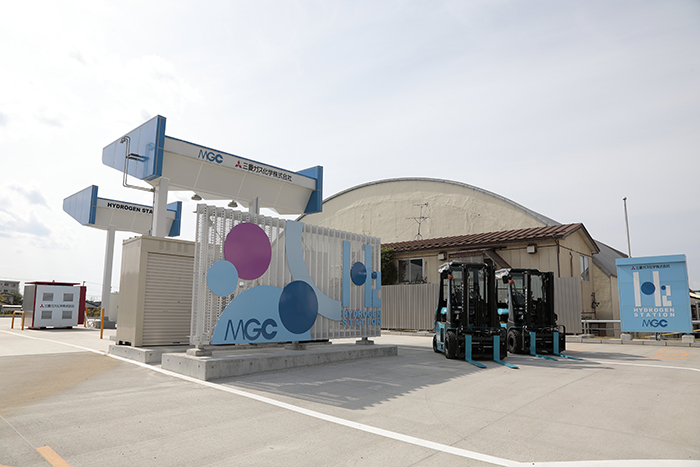
Many companies are working in various ways to reduce CO2 emissions toward the goal of carbon
neutrality by 2050. Mitsubishi Gas Chemical (MGC) is no exception. It has operated a
hydrogen station and seven hydrogen-powered fuel cell forklifts (hereafter, FC forklifts) at
its Niigata Plant since October 2022. MGC is also using two Toyota hydrogen-powered fuel
cell vehicles as company vehicles.
The hydrogen station produces hydrogen by electrolyzing water using PDC Machines'
SimpleFuel™, a hydrogen refueling system for FC forklifts. The Niigata Plant has been
purchasing Non-Fossil Certificates since April 2022 and uses electricity derived from
renewable energy sources to produce hydrogen.
The FC forklifts are used to load and unload items for deliveries, produce zero CO2
emissions during operations, and can be refueled quickly. In FY2022, the FC forklifts were
in operation for 387 hours, leading to a reduction in 1.5 tons of GHG emissions compared to
conventional diesel forklifts. The forklifts are quickly proving to be effective in reducing
CO2 emissions.
We Want to Lead the Industry and Expand the Horizons of Hydrogen Utilization
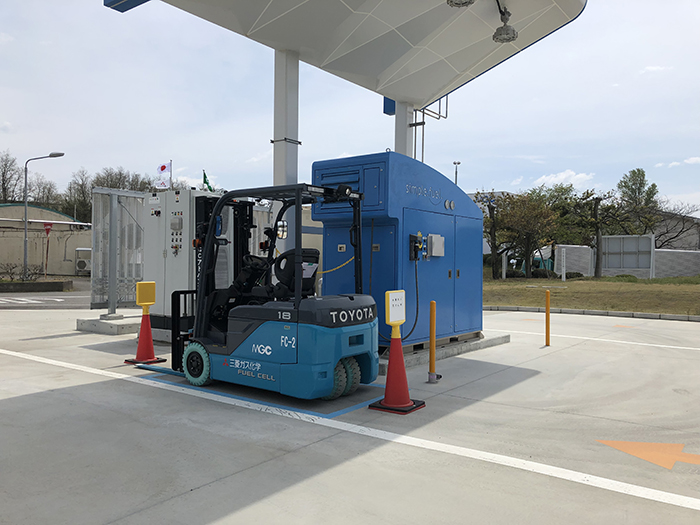
At the Niigata Plant, we aim to disseminate and demonstrate the value of hydrogen through
the introduction of this hydrogen station, FC forklifts, and fuel cell vehicles, and we want
to expand the horizons of hydrogen utilization. Yoshio Waguri and Yasuaki Kambe of the SX
Department at the Niigata Plant speak of the initiative as such.
"In Niigata Prefecture, there are hydrogen stations at the Niigata Plant and another near
the Niigata Prefectural Government Office. However, in terms of infrastructure, it's not
widely spread compared to large cities. Some people are concerned that hydrogen stations are
dangerous because they store hydrogen at high pressure. However, since safety measures are
in place, I think it can be spread widely if we understand that hydrogen can be used safely.
(Waguri)
"It is considered that issues remain for using fuel cell vehicles in logistics. For example,
suppose there is no hydrogen station at a company where a truck is delivering goods. In that
case, it will be difficult to return due to the distance. I believe we can reduce CO2
emissions drastically if companies install hydrogen stations and make refueling possible."
(Kambe)
Implementation of Wide-Ranging Initiatives Aimed at 38% Reduction Compared to 2013
MGC has set the ambitious goal of reducing GHG emissions in 2023 by 38% compared to 2013 and
has positioned initiatives aimed at the social implementation of carbon neutrality at the
Niigata Plant at the core of this goal. The Niigata Plant is implementing the initiatives
below in addition to the hydrogen station and FC forklifts mentioned earlier.
1. Energy conservation
Promotion of a reduction in the amount of energy used to produce chemicals.
2. Switch to Electricity from Renewable Energy Sources
From April 2022, to make 100% of purchased electricity virtually renewable by purchasing
non-fossil certificates equivalent to the total purchased electricity.
3. Production of Circular Carbon Methanol
Production of methanol from waste products such as CO2 and plastics and then using the
methanol produced as a raw material for plastics, fuel, and electricity production.
Furthermore, the CO2 derived from the chemical process and spent plastics can be once again
used as feedstocks for methanol. We have named this concept Circular Carbon Methanol
Carbopath™. We have been implementing demonstration experiments of Carbopath™ since August
2021.
4. Promotion of CCUS (Carbon dioxide Capture, Utilization, and Storage)
In addition to the production of Circular Carbon Methanol using CO2 mentioned above,
conducting investigations leads to the underground storage of CO2 by injecting CO2 derived
from our plant operation into gas fields.
"We have formulated various plans toward 2050 at the Niigata Plant. It will be challenging
to achieve carbon neutrality unless we do what we can do now. " (Waguri)
With Companies Struggling, Now is the Time for Cooperation and Mutual Assistance
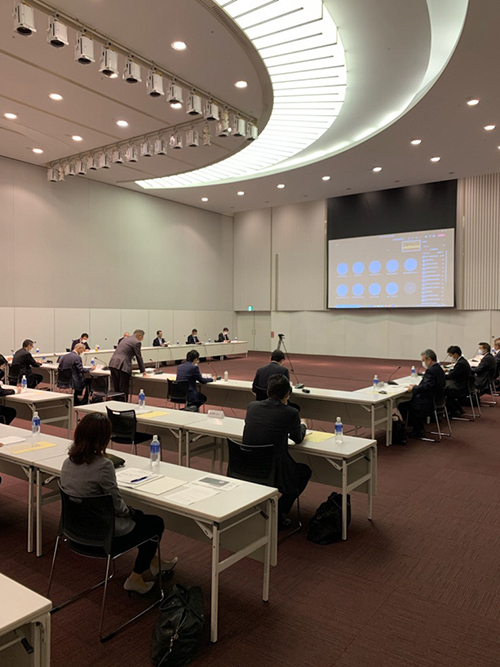
A regional council for carbon neutrality and hydrogen utilization promotion is being held by
Niigata Prefecture, and MGC is a participating member. Local governments and companies from
inside and outside the prefecture are exchanging opinions on carbon neutrality, hydrogen
utilization and regional infrastructure development.
"My honest impression from participating in the council was that both local governments and
companies are struggling. Some large-scale emitters are troubled as they say, 'What we can
do is limited.' We are also an energy-intensive industry, so everyone understands its
difficulty. " (Kambe)
Nevertheless, MGC is standing up to the challenge. This is because their mission is
"Creating value to share with society," and they want to contribute to the development of a
sustainable society.
"Within the Mitsubishi Group as well, I hope we can advance our initiatives towards 2050 by
collaborating across industry boundaries and combining the expertise of each company"
(Waguri)
"By exchanging information, inspiring each other, and helping one another, I believe we can
find good solutions. It would be great that the momentum expands beyond each company and we
work together with the entire Mitsubishi Group." (Kambe)
Achieving carbon neutrality overnight is difficult. Now is the time for collaboration.
INTERVIEWEE
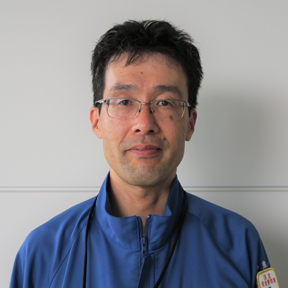
YOSHIO WAGURI
SX Department , Niigata Plant
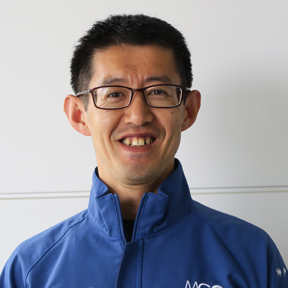
YASUAKI KAMBE
SX Department (Carbon Neutral Group), Niigata Plant
MITSUBISHI GAS CHEMICAL COMPANY, INC.
Mitsubishi Building, 5-2, Marunouchi 2-chome, Chiyoda-ku, Tokyo
MGC was founded in 1951. The company engages in a wide and diverse range of
businesses, from methanol, hydrogen peroxide, high-performance engineering plastics,
and chemical/material products to functional products such as foamed plastics and
oxygen absorber AGELESS™. The company aims to contribute to social development and
harmony through the creation of wide-ranging value based on chemistry.
